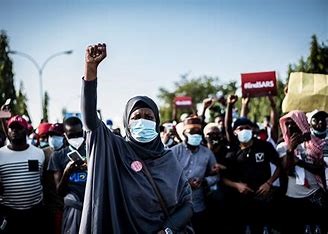The #EndSARS Protest that swept across Nigeria in October 2020 was an important moment for the country. What began as a nonviolent demonstration against police brutality quickly turned into something much bigger, inspiring people all around the world to stand up for what is right and demand changes from their governments.
The movement was fueled by numerous accounts of police brutality, including extortion, harassment, unlawful arrests, and extrajudicial killings, which had long been endured by the citizens, particularly the youth population. This perception has left a lasting impact on the view of the police force not only among Lagos youths, but Nigeria as a whole. The lack of accountability for the officers involved in cases of brutality and the failure to implement meaningful reforms have reinforced the notion that the police force is unwilling or incapable of changing its ways.
There has been a great demand for the police to curb these criminals, ranging from armed robbers to murderers, which has intensified because of the general public’s fear about crime. Yet, the Nigerian police have used public indignation to often justify violations of human rights as important components of criminal investigation.

According to a research by Winnie Bamson (2023) Lagos youths have since after the EndSARS claimed to not see any changes in the accountability of police officers, or their manner of approach towards youths. Various youths have shared their stories on encounters with the police after EndSARS that left them scarred and vulnerable.
The #EndSARS demonstrations expanded beyond the topic of police brutality to include a wider range of political and constitutional reforms that aspired to create effective governance, fiscal federalism, and political reorganization. The youthful demonstrators wanted a clear reaction from the president, whom they regarded to be uninterested, in addition to calling for a stop to police brutality.
This problem goes beyond Nigeria since there are other reports of police violence against peaceful protesters and journalists across Africa because of bad governance, and these reports are supported by convincing evidence of serious human rights abuses.
The protests were made worse by the already-present lack of confidence between the demonstrators and the government, which also accentuated how oppressive the youth population of Lagos were. The demonstrators rejected the suggested police reforms and demanded more extensive political and constitutional changes since they had mistrust for the government and its security agencies.
The #EndSARS protest was subsequently viewed by the government as a confrontational and revolutionary movement that sought to topple the government, which increased their mistrust of the populace and led to state repression, crackdowns, and the excessive use of military force against nonviolent protestors, escalating the conflict.

The #EndSARS protests influenced Lagos youth’s perceptions of law enforcement in Nigeria. Due to the law enforcement’s ineffectiveness in stopping several acts of indiscipline, the youths believe that law enforcement would not act to stop wrongdoings, and this has influenced their views toward law enforcement since they anticipate that nothing will be done about their problems no matter how loudly they complain.
The tragic killing of Bolanle Raheem serves as a heartbreaking illustration of police violence and corruption in Nigeria. Her premature passing highlights the critical need for police reform in the nation, with the goal of preventing such occurrences. Young people in Nigeria, who have disproportionately suffered from police violence, have become more outspoken and active because of Bolanle’s death
There is the urgent need to improve the training of the police in terms of respect for human rights. Human rights education should be made compulsory at all levels of education in the country, most especially in police colleges and their academies. The police authorities must place emphasis on the teaching of human rights during their training of police recruits who are most often culpable of committing violations of rights.
Sources




